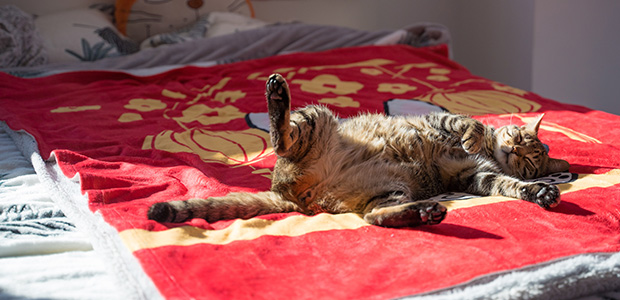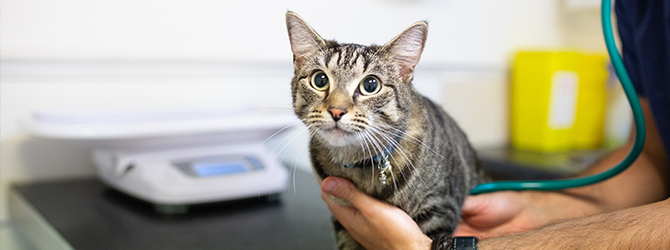Dementia in cats: spotting the signs of feline dementia
First Published: 24/01/2020
Last Updated: 23/11/2023
Cat dementia has become more common in recent years — a side effect of modern-day cats leading longer lives than ever before.
Let’s take a closer look at dementia in cats: what is it, how to spot the signs, and how to make sure your cat stays well looked after during their elderly years.
What is cat dementia?
Feline dementia, previously known as Cognitive Dysfunction Syndrome (CDS), works in a very similar way to Dementia and Alzheimer ’s disease in humans.
As cats grow older, their cognitive (brain) function can start to degenerate. Some cases are worse than others, and Dementia is diagnosed in cats according to symptoms and behaviour.
Cognitive dysfunction is fairly common, and can affect around one-third of cats aged between 11 and 14 years.
Read more: Hip dysplasia in cats
Symptoms of dementia in cats
As with humans, it can be difficult to decide if a cat’s symptoms are serious or if they’re ‘just old age.’ With feline dementia, there is definitely some overlap.
Certain symptoms can belong to other physical conditions (i.e. if your cat is missing their litter tray, it could be a problem with their vision or they could be suffering from feline arthritis), but you should definitely contact your vet if your cat displays any of these signs:
- Losing balance/falling over
- Doing their business inside
- General forgetfulness
- Excessive meowing, particularly at night
- Sleeping more, especially during the day
- Becoming more clingy, distant or any change to their sociability

Diagnosis and treatment: how to help your cat?
Rather than excessive brain-scanning, the vet will diagnose dementia in your cat by thoroughly evaluating their symptoms.
Sadly, there’s no cure for Cognitive Dysfunction. However, various methods of supportive care can help your cat stay comfortable during their elderly years. There are things the owner can do too, such as:
Keeping their home environment as stress-free as possible – Elderly cats are even more averse to change than younger cats. Try to keep things where they are, to provide your cat with lots of places to go to the toilet and to stick to a routine as much as possible. If your cat gets lost or confused easily, it may be a good idea to limit the amount of space they have access to.
Read more: Cat anxiety: how to help a stressed cat.
Enrichment – Continue socialising with your cat and play games if you can. The mental stimulation will keep their brain working and slow down the symptoms of Cognitive Dysfunction.
Regular vet visits – Regular health checks will help both you and your vet stay on top of your cat’s condition. The vet will advise on how to help your cat – their specific condition and symptoms. They’ll also be able to provide medication when necessary.
Note: Blood tests can be very helpful in diagnosing and monitoring the situation, ensuring the cat is not suffering from other, more treatable diseases that may have similar signs to dementia e.g. feline hyperthyroidism (thyroid problems) or renal disease.
Need more info about feline dementia?
For more help and advice on the signs of dementia in cats, keeping your cat mentally stimulated or any other aspect of their welfare, have a chat with your local vet.
Find your nearest vet using our Find a Vet page, or speak to a vet online using Online Vets.


